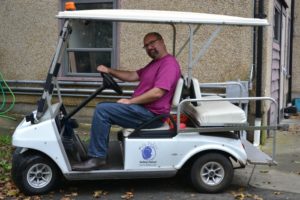Camosun College recently contributed $10,000 to the Camosun College Student Society (CCSS) Walk Safer program.
The program assists students who want to be escorted to or from their car or between Camosun’s buildings; Walk Safer staff also patrol the campuses in the evenings. Walk Safer is staffed primarily by work-study students and volunteers.
“We asked for the college to make a further contribution, and they did,” says CCSS student services coordinator Michael Glover. “They stepped up to the plate.”

Glover says that this latest college contribution helps keep staffing a bit more consistent, which has long been a struggle for Walk Safer.
“The program has been dependent on volunteers for years, but volunteering has sort of gone up and down in terms of what people can commit,” he says. “So we’ve been trying to stabilize the program, and the college has given money to that effect for a number of years.”
Glover says the donation allows more students to patrol campus. He says he is still trying to extend the program to more locations throughout campus; he also wants the program to have longer hours; it currently runs from 6:30 pm to 10:20 pm at Lansdowne, and from 6:30 pm to 10:10 pm at Interurban.
“We’re here a good chunk of time after people have left,” says Glover.
Walk Safer Lansdowne shift supervisor Shannon Soares says the root of the job lies in keeping the Camosun grounds and its people safe.
“Everyone says no place is safe enough, and it’s true,” says Soares. “We’ve had some people talking to us and they’ve been not necessarily physically, sexually assaulted, but they’ve been looked at in inappropriate ways. People have some pretty scary stories.”
Soares says that Walk Safer gets around 15 calls on an average night but says that it varies, with some nights seeing “about 40 people” calling, while a recent night only had two. He points out, though, that the majority of high-volume nights are due to bad weather, particularly at Interurban, where the campus is more spread out, making for longer walks between buildings. Still, he says that Victoria—and Camosun—is less safe than people think.
“[Victoria is] not as safe as they actually make it out to be, and Camosun isn’t either,” he says. “Even though all people may not actually come and use the service, just the fact that they know we are available to them, I think, makes life so much more comfortable, you know?”
Soares says that doing a job that centres on the comfort and safety of others is very meaningful.
“It feels good,” he says. “We don’t only help people. Sometimes people just want someone to talk to; people come to our table and just talk to us.”
Soares says most of the time, people and events around campus are fine, but that’s no excuse for not being prepared.
“The only worry I have is people not taking enough precautions,” he says, “because they think everything around them is safe.”
The Walk Safer table is located at the entrance to the Fisher building at Lansdowne and at the main entrance to the Centre for Business and Access at Interurban.
Walk Safer staff and volunteers do approximately five campus rounds per night in golf carts at each campus.
